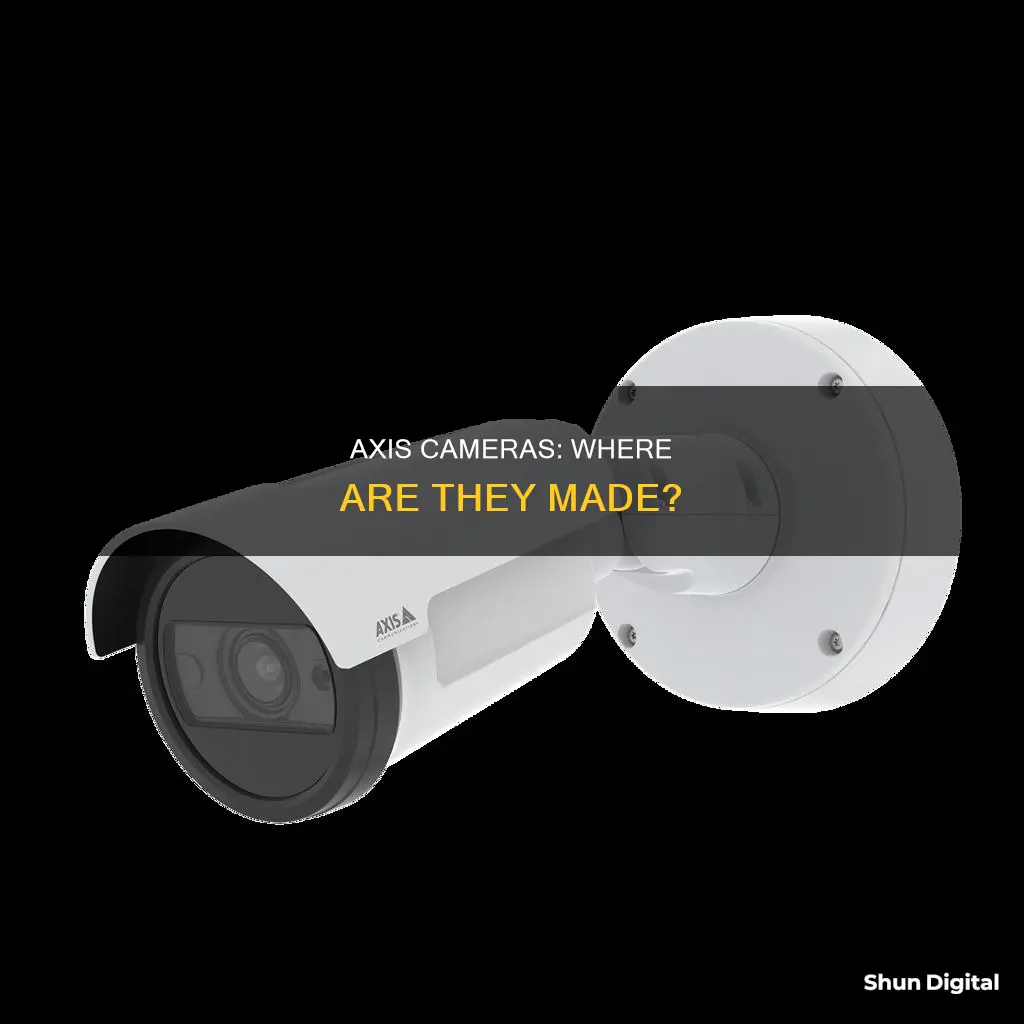
Axis Communications AB is a Swedish manufacturer of network cameras, access control, and network audio devices for the physical security and video surveillance industries. The company was founded in 1984 by Martin Gren, Mikael Karlsson, and Keith Bloodworth in Lund, Sweden, and has since expanded to operate in over 50 countries worldwide. While Axis Communications primarily manufactures its products in Sweden, it has also partnered with global electronics manufacturing services (EMS) partners located in other countries, such as Thailand and the Czech Republic. In 2017, the company announced that it would be ending the manufacturing of products in China, except for those dedicated to the Chinese market, due to concerns about the security of Chinese-made cameras.
| Characteristics | Values |
|---|---|
| Country of Origin | Sweden |
| Manufacturer | Axis Communications AB |
| Industry | Video Surveillance, Physical Security |
| Headquarters | Lund, Sweden |
| Number of Employees | 4,000 |
| Countries of Operation | Over 50 |
| Parent Company | Canon Inc. |
| Canon's Ownership | Majority Shareholder |
| Operational Independence | Yes |
| Notable Products | AXIS 200, AXIS 2100, AXIS 205 |
| EMS Partners | Thailand, Czech Republic, China |
What You'll Learn

Axis Communications AB is a Swedish manufacturer of network cameras
Initially, the company developed and sold protocol converters and printer interfaces for connecting PC printers to IBM mainframe and mini-computer environments. However, by the early 1990s, Axis Communications began shifting its focus towards networking and the TCP/IP protocol. This shift in focus led to the development of the industry's first network camera, the AXIS 200, in 1996. This innovation marked Axis Communications' entry into the video surveillance market and leveraged its expertise in network technology.
Over the years, Axis Communications has continued to innovate and expand its product offerings. In 1999, they released the AXIS 2100, the first volume product using embedded Linux. The company introduced the smallest network camera at the time, the AXIS 205, in 2003. Axis Communications also ventured into new product categories, such as body cameras, video encoders, video management software, physical access control, and network audio solutions.
In 2015, Axis Communications became an independent subsidiary of Canon Inc., a Japanese multinational corporation specializing in imaging and optical products. While Canon holds a majority stake, Axis maintains its independence in operations. This partnership has allowed Axis Communications to expand its global reach and continue developing advanced network camera solutions.
Axis Communications' network cameras are known for their diverse range, including pan-tilt-zoom (PTZ) cameras, vandal-resistant cameras, thermal cameras, nitrogen-pressurized cameras, and wireless cameras. The company has achieved several milestones, such as launching the world's first commercially available thermal network camera in 2010 and the first HDTV network camera in 2008. Axis cameras are also equipped with advanced features like video content analysis and artificial intelligence for video surveillance applications.
In addition to its technological advancements, Axis Communications prioritizes sustainability. In 2019, the company published a sustainability report stating that 80% of its network cameras and video encoders are PVC-free. Axis Communications is committed to creating innovative, long-term, and reliable products that contribute to a smarter and safer world.
Smart Doorbell Camera Options Without Monthly Fees
You may want to see also

Axis cameras are made in Sweden, Thailand and the Czech Republic
Axis Communications AB is a Swedish manufacturer of network cameras, access control, and network audio devices for the physical security and video surveillance industries. The company was founded in 1984 in Lund, Sweden, and has since expanded its operations globally, with offices in over 50 countries and a workforce of approximately 4,000 employees.
Axis cameras are made in multiple countries, including Sweden, Thailand, and the Czech Republic. The manufacturing locations vary depending on the specific camera model. For example, the M series of Axis cameras are manufactured in Thailand, while the P/Q series are produced in Sweden. Additionally, there is one P series dome camera that is made in the Czech Republic.
Axis takes a hybrid approach to production, developing the software and designing the hardware in-house, while partnering with global Electronics Manufacturing Services (EMS) partners for the actual production of the cameras. This allows Axis to maintain control over the critical aspects of product development while leveraging the expertise and efficiencies of specialized manufacturing partners.
In recent years, Axis has shifted away from manufacturing in China for the global market. While they still produce some models in China, these are primarily dedicated to the Chinese market due to the country's trade policies and regulations.
Axis has a strong focus on sustainability and released a report in 2019 stating that 80% of its network cameras and video encoders are PVC-free. The company is committed to creating innovative, long-term, and reliable products that contribute to a smarter and safer world.
Unlocking Kik Camera: Modding for Creative Freedom
You may want to see also

Axis cameras are NDAA-compliant
Axis Communications AB is a Swedish manufacturer of network cameras, access control, and network audio devices for the physical security and video surveillance industries. The company was founded in 1984 by Martin Gren, Mikael Karlsson, and Keith Bloodworth in Lund, Sweden, and has since expanded its operations to over 50 countries worldwide, employing over 3,800 people.
In recent years, Axis has taken steps to ensure that its products are compliant with the National Defense Authorization Act (NDAA) restrictions put in place by the United States federal government. The NDAA prohibits federal agencies, contractors, and grant or loan recipients from procuring or using telecommunications and video surveillance equipment with certain components or critical technology from specific Chinese manufacturers. Axis has confirmed that its entire product portfolio, including solutions marketed to the US government, Department of Defense (DoD), and associated contractors and affiliates, is fully compliant with the NDAA.
The company's commitment to NDAA compliance is evident in its decision-making regarding hardware and chip suppliers. Axis discontinued its Companion hardware line, which used Huawei Hisilicon chips, to ensure full NDAA compliance. Additionally, Axis does not employ any System on Chip (SoC) or other software-processing components from the banned Chinese companies. Instead, all Axis products use NDAA-compliant chipsets, with most products utilizing in-house developed ARTPEC® chips exclusive to the company.
Axis's proactive approach to NDAA compliance is a testament to its dedication to providing secure and reliable products to its customers. The company understands the importance of adhering to government regulations and maintaining the highest standards of cybersecurity. By ensuring NDAA compliance, Axis not only meets legal requirements but also reinforces its commitment to delivering innovative, long-term, and reliable solutions to its customers.
HDR Mode: Capturing Stunning Photos with Your S8 Camera
You may want to see also

Axis was the first company to create an IP surveillance camera in 1996
Axis Communications AB, a Swedish manufacturer of network cameras, access control, and network audio devices for the physical security and video surveillance industries, was the first company to create an IP surveillance camera in 1996. The company was founded in 1984 by Martin Gren, Mikael Karlsson, and Keith Bloodworth in Lund, Sweden.
Axis Communications initially developed and sold protocol converters and printer interfaces for connecting PC printers in IBM mainframe and mini-computer environments. By the end of the 1980s, the company expanded its reach by opening its first US sales office in Boston, Massachusetts. In the early 1990s, Axis Communications began shifting its focus from IBM mainframes toward networking and the TCP/IP protocol. This shift in focus led to the development of their groundbreaking IP surveillance camera.
In 1996, Axis Communications introduced the AXIS 200, the industry's first network camera. This camera revolutionized the surveillance market by allowing people with an internet connection to remotely monitor locations from anywhere in the world. The company's expertise in network technology and commitment to creating a smarter and safer world fueled this innovation.
The launch of the AXIS 200 was a significant milestone, as it marked the beginning of the transition from analog to digital video surveillance. Axis Communications' early adoption of IP technology and their collaboration with other industry leaders, such as Bosch and Sony, contributed to their position as a pioneer in the surveillance camera industry. This move towards IP cameras offered improved image quality, remote accessibility, and enhanced interoperability with other systems.
While Axis Communications was the first to introduce an IP surveillance camera, it is worth noting that the company's initial focus was on mainframe and printer technology. Geovision, a Taiwanese company, was one of the first companies to gain significant traction in the IP camera market during the early 2000s. However, their decision to charge licensing fees for non-Geovision devices connecting to their system led to their decline in market share.
Selfie Mode: Why Your Camera is Stuck and How to Fix It
You may want to see also

Axis is run independently, with Canon as the majority shareholder
Axis Communications AB is a Swedish manufacturer of network cameras, access control, and network audio devices for the physical security and video surveillance industries. The company was founded in 1984 by Martin Gren, Mikael Karlsson, and Keith Bloodworth in Lund, Sweden.
In 2015, Axis Communications became an independent subsidiary of Canon Inc. following a cash bid of 23.6 billion Swedish kronor (US$2.83 billion) from the Japanese multinational corporation. Canon Inc. is a specialist manufacturer of imaging and optical products.
While Canon is the majority shareholder in Axis Communications, the Swedish company continues to operate independently. Canon's network cameras are sold and supported by Axis Communications in the EMEA (Europe, the Middle East and Africa) region, as well as in North America, and other select markets.
Axis Communications has expanded its operations globally, with offices in over 50 countries and a workforce of over 3,800 people. The company has also diversified its product portfolio beyond network cameras, offering video encoders, video management software, body cameras, and radar solutions.
The independence of Axis Communications allows the company to maintain its own brand identity and business operations while benefiting from the resources and expertise of Canon as the majority shareholder. This structure enables Axis to leverage Canon's technological capabilities and global reach while retaining the agility and specialization that comes with independent management.
Charging Your Sanyo E1090: Quick and Easy Guide
You may want to see also
Frequently asked questions
As of 2022, all Axis CCTV cameras are manufactured in either Sweden or Thailand.
Axis cameras are not manufactured in China. However, some critical components may be made in the country, but the company is working to replace these with parts that adhere to the United States NDAA guidelines.
The headquarters of Axis Communications is in Lund, Sweden.
Axis Communications was founded in 1984 by Martin Gren, Mikael Karlsson and Keith Bloodworth.
Axis Communications has around 4,000 employees in over 50 countries.







